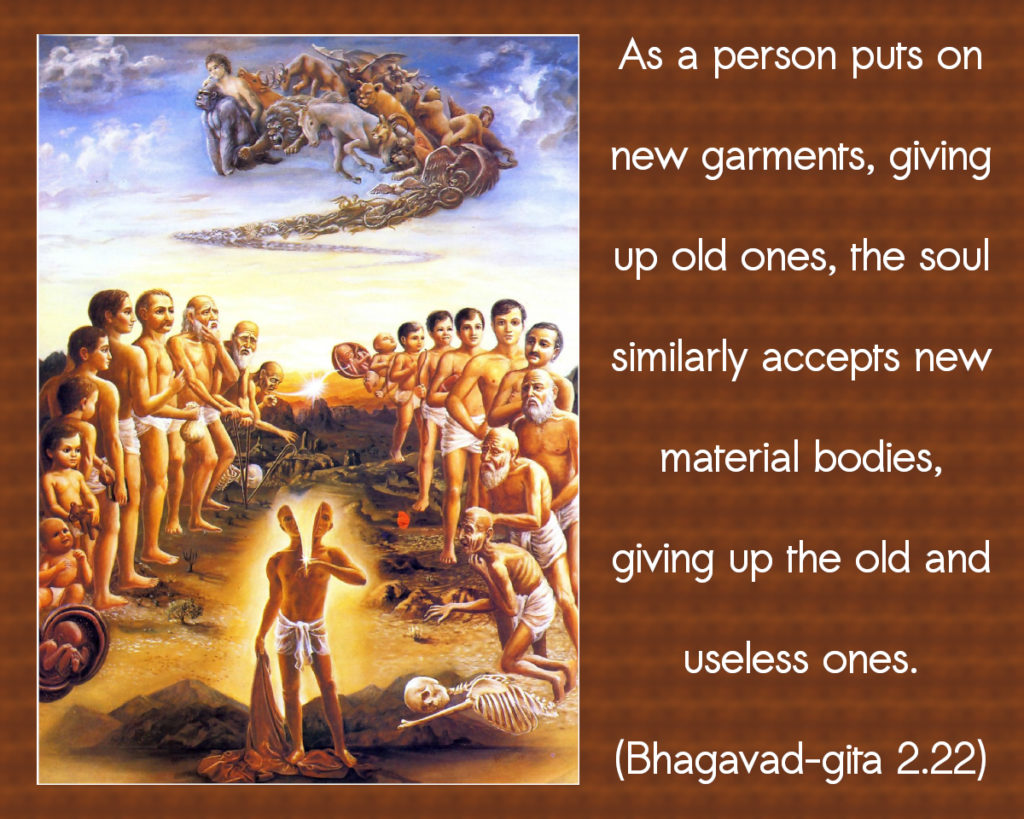वासांसि जीर्णानि यथा विहाय
नवानि गृह्णाति नरोऽपराणि |
तथा शरीराणि विहाय जीर्णा
न्यन्यानि संयाति नवानि देही || 22||
vāsānsi jīrṇāni yathā vihāya
navāni gṛihṇāti naro ’parāṇi
tathā śharīrāṇi vihāya jīrṇānya
nyāni sanyāti navāni dehī
vāsānsi—garments; jīrṇāni—worn-out; yathā—as; vihāya—sheds; navāni—new; gṛihṇāti—accepts; naraḥ—a person; aparāṇi—others; tathā—likewise; śharīrāṇi—bodies; vihāya—casting off; jirṇāni—worn-out; anyāni—other; sanyāti—enters; navāni—new; dehī—the embodied soul
Translation:
Just as a man casts off his worn-out clothes and puts on new ones so also the Self throws away its worn-out bodies and takes other fresh bodies.
Commentary:
The Lord adopts the method of explaining his ideas by means of vivid similes. Such comparisons help to make the idea clear to the common man. We have here a familiar simile to explain a very high vedantic doctrine that the body is just like a garment worn by man and just as these garments are changed from time to time, even so, the Jiva goes on changing the physical body birth after birth. No one grieves when he casts off dirty and torn clothes and puts on other fresh garments. No one grieves when the autumn-withered leaves fall off from the branches. There is always the knowledge that fresh leaves come up with the arrival of spring. The whole of Nature presents such alternate pictures of bareness and beauty according to the changes of seasons. The Lord points out that death is no more than the rejection of the old and decayed body. The Jiva drops off the decayed body by death and adopts a fresh one. So there is absolutely no cause for grief. But of course, to destroy the past karma by supreme jnana, and escape from the cycle of birth and death is the reward of the highest realisation.
Bodies:- The plural is used here to show that man has to pass through innumerable bodies, birth after birth, so long as he remains ignorant of his real nature.
Worn out:- We have to interpret this word as bodies whose karmic force is exhausted. We see that people die in child and youth. When the physical body is not supposed to be old or worn out. In such cases, the karmic force for that particular body is exhausted and it falls off accordingly.
The Vedantic doctrine is that the Self remains deathless, passing from one body to another, according to the force of Karma done with the body. These bodies(upadhis) continue to change but the real man, Atma, remains unaffected and changeless.
Swami Vivekananda Says —
So far [we have discussed] God and nature, eternal God and eternal nature. What about souls? They also are eternal. No soul was [ever] created; neither can [the] soul die. Nobody can even imagine his own death. The soul is infinite, eternal. How can it die? It changes bodies. As a man takes off his old, worn-out garments and puts on new and fresh ones, even so the worn-out body is thrown away and [a] fresh body is taken.[Source]
There are two sorts of races, the divine and the demonic. The divine think that they are soul and spirit. The demonic think that they are bodies. The old Indian philosophers tried to insist that the body is nothing. “As a man emits his old garment and takes a new one, even so the old body is [shed] and he takes a new one.”[Source]
And just as a leech moving on a blade of grass reaches its end, takes hold of another and draws itself together towards it, so does the self, after throwing off this body, that is to say, after making it unconscious, take hold of another support and draw itself together towards it. (Brihadaranyaka Upanishad 4.4.3)
See also:
